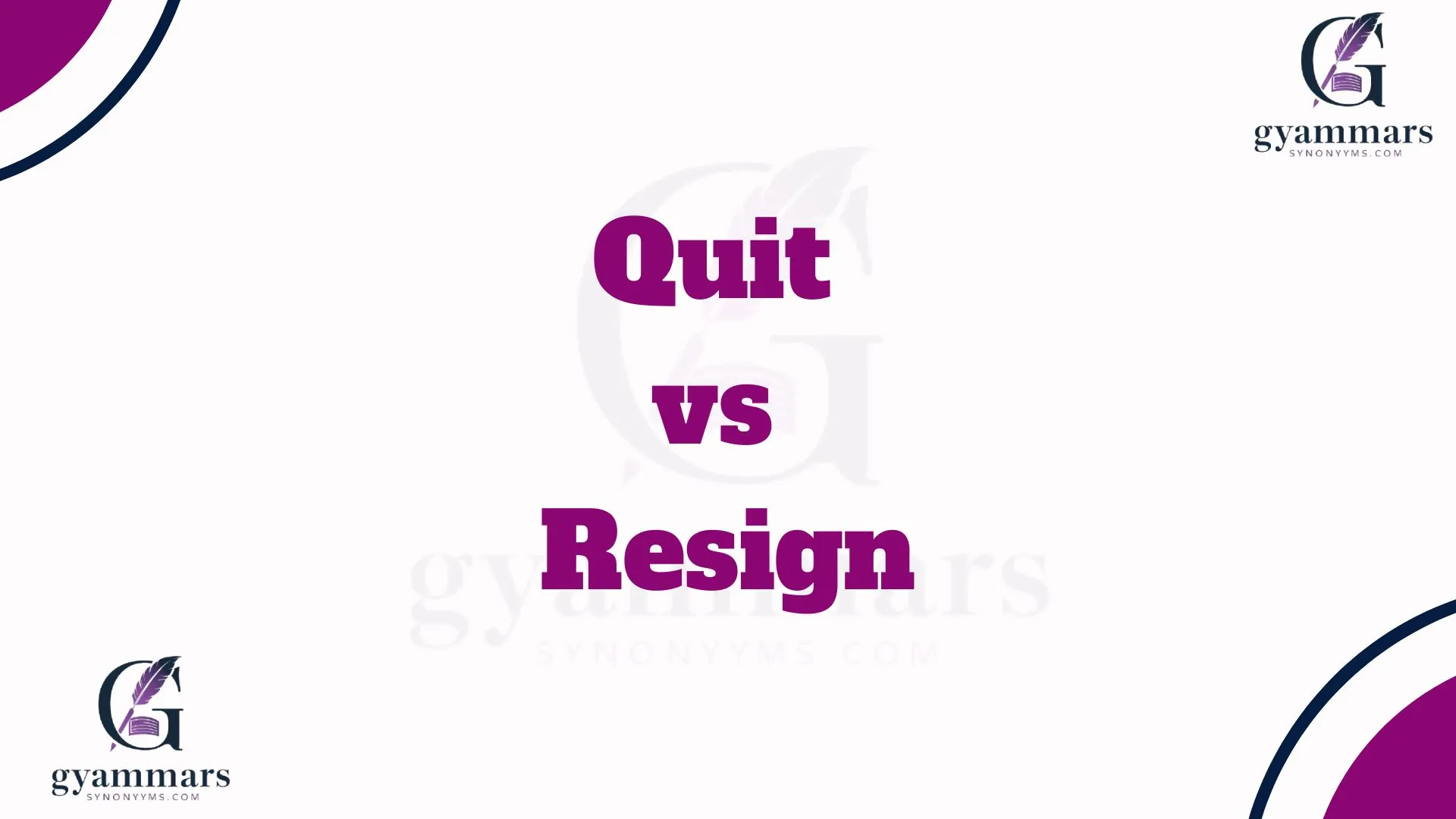When it comes to leaving a job, many of us face a crucial decision: should I quit or should I resign? While these terms are often used interchangeably, they actually have different meanings, implications, and consequences.
Understanding the distinction between quitting and resigning can significantly impact your career trajectory, your reputation, and even your future job opportunities.
In this article, we’ll clear up the confusion once and for all, helping you understand the subtle yet significant differences between quitting and resigning, and when each is appropriate.
Whether you’re leaving a job for personal reasons, seeking a better opportunity, or dealing with a toxic work environment, the way you exit matters more than you might think.
At first glance, quitting and resigning may seem similar—after all, both involve leaving your current job. However, the tone, formality, and consequences of these actions are what truly set them apart.
By diving deep into the definitions, real-world scenarios, psychological effects, and even the legal and financial consequences, we will ensure you have the knowledge needed to make the right decision for your personal and professional situation.
Understanding these two terms might seem trivial, but in today’s competitive job market, first impressions count—and your exit from a company is often the last impression you’ll leave behind.
So, whether you’re stepping into a new career or seeking a fresh start, it’s important to know the difference between quitting and resigning and how each decision will shape your future.
Let’s begin by breaking down exactly what “quit” and “resign” mean, and why it’s essential to use the correct term in your exit strategy.
Defining “Quit” vs. “Resign”
Quit: More Informal, Abrupt, and Often Emotional
The word “quit” often carries an emotional undertone. It’s typically seen as a more impulsive or spontaneous decision, one that might come after frustration, disappointment, or burnout. When someone quits, they usually leave without giving much notice, and the exit is often abrupt. In many cases, quitting can be associated with a feeling of being done with the situation, and it often involves leaving without a formal transition.
Context of Quitting:
- Emotionally Charged: People often quit when they’re feeling unhappy, overwhelmed, or frustrated with their job. It’s more of a reaction to a current situation rather than a calculated decision.
- Sudden and Without Notice: Many people who quit don’t provide any prior notice to their employers. This could be due to personal reasons or a deep dissatisfaction with the job.
- Perception of Quitting: While quitting can sometimes be seen as a sign of strength or courage, it can also have a negative connotation. Quitting might make it seem like the person is running away from the problem rather than dealing with it.
Resign: Formal, Respectful, and Planned
On the other hand, resigning is viewed as a much more formal and professional decision. When you resign, you typically inform your employer in advance, offering notice—usually two weeks—to ensure a smooth transition. Resigning is often considered a respectful and well-thought-out choice, showing that you have made a decision to leave the job with dignity and professionalism.
Context of Resigning:
- Planned and Thoughtful: Resignation is typically a well-considered decision. You might resign because you’re pursuing a better opportunity, retiring, or need to step away for personal reasons.
- Advance Notice: Providing a notice period (like two weeks) is standard practice when resigning. This shows consideration for the employer and ensures that the transition is as smooth as possible.
- Professional and Respectful: Resigning shows that you care about your professional reputation and the relationships you have built with your employer and colleagues.
In summary, quitting is more spontaneous, often driven by emotion, and lacks formal structure, while resigning is planned, formal, and often carried out with respect for both parties involved.
Key Differences Between Quitting and Resigning
Tone and Formality
The most obvious difference between quitting and resigning lies in their tone and formality. When you quit, you’re usually expressing frustration, dissatisfaction, or urgency. The tone is often more casual and sometimes even defiant. Resigning, on the other hand, comes across as professional and respectful. The formal tone and structure of resignation letters and conversations reflect a more calculated decision to leave the company.
Notice Period
One of the most practical differences between quitting and resigning is the notice period. When you resign, you typically give notice (usually 2 weeks) to allow your employer to prepare for your departure, whether it’s finding a replacement, distributing your workload, or planning your transition. In contrast, when you quit, there’s often no prior notice given, and you may leave on the spot or within a very short time frame.
Professional Impact
How you exit a company can have a significant impact on your professional reputation. Resigning with proper notice and professionalism can leave a positive impression, ensuring that you maintain strong relationships with your employer and colleagues. Quitting, however, especially without notice, can tarnish your reputation, making future references more difficult to obtain. Employers may view an employee who quits abruptly as unreliable or unprofessional.
Emotional Undertones
Quitting often comes with a sense of emotional release. You may feel as though you’re escaping a bad situation. However, this sense of relief might also be accompanied by feelings of regret or unresolved issues. Resigning, however, is typically a more calm and rational decision, giving you closure and allowing you to leave with a sense of accomplishment.
Legal Implications
In some cases, the decision to quit or resign can have legal and financial consequences. For instance, employees who quit without notice may not be eligible for certain benefits like severance pay, unemployment insurance, or other compensations. Resigning, on the other hand, typically does not affect eligibility for these benefits, especially if you provide the required notice.
Real-World Scenarios: When Should You Quit vs. Resign?
Scenario 1: Toxic Work Environment
If you’re working in an environment where you feel unsafe, harassed, or completely unhappy, quitting might be the best option. Your mental health and well-being should always come first, and sometimes leaving a toxic workplace without notice is necessary for your own peace of mind.
Example:
Imagine you’re dealing with a manager who constantly undermines your efforts, creating a hostile work environment. In this case, you may decide to quit immediately to escape the negative environment. Your personal well-being is more important than maintaining professionalism in this scenario.
Scenario 2: Career Advancement
If you’re leaving your job for a better opportunity, it’s always best to resign with proper notice. Resigning shows professionalism and respect for the company, and it also leaves the door open for future collaborations or references.
Example:
Let’s say you’ve been offered your dream job at a different company. In this case, resigning with a formal letter of resignation, expressing gratitude for the opportunity, and providing the necessary notice allows you to leave on good terms.
Scenario 3: Personal Circumstances
Sometimes, you may need to leave your job for reasons unrelated to your work, such as family obligations, health issues, or relocation. If your situation allows, it’s better to resign with proper notice. If not, quitting might be the only option.
Example:
Suppose you have to relocate for a family emergency and can’t give much notice. In this case, quitting might be unavoidable, but it’s still important to remain respectful in your resignation conversation and express appreciation for the company’s support.
Psychological Effects: Quitting vs. Resigning
The Emotional Impact of Quitting
While quitting can bring a sense of immediate relief, especially in challenging work environments, it may also leave you feeling unsettled or regretful. Quitting without closure may create emotional baggage that impacts future job opportunities and relationships.
The Sense of Closure in Resignation
On the flip side, resigning allows for a sense of closure. A formal resignation lets you exit on your own terms, knowing you’ve handled the situation with professionalism. This can give you confidence in moving forward and can be a stepping stone in your career development.
Legal and Financial Consequences of Quitting vs. Resigning
Unemployment Benefits
One of the biggest concerns when quitting is the impact on your eligibility for unemployment benefits. If you quit without good cause or without notice, you may not be entitled to these benefits. Resigning with a valid reason, like seeking new opportunities, typically doesn’t affect your eligibility.
Severance Pay
If you resign professionally and with notice, you might still qualify for a severance package or other benefits, depending on company policies. However, if you quit abruptly, you might forfeit these benefits.
Non-compete Agreements
In some industries, non-compete clauses come into play when leaving a company. If you resign, you may be subject to the terms of your non-compete agreement. Quitting, however, could complicate these terms and affect your future employment prospects.
How to Resign Professionally
Tips for Crafting a Resignation Letter
- Express Gratitude: Even if you’re leaving due to dissatisfaction, maintain a professional tone and thank your employer for the opportunity.
- Provide Notice: Offer the standard two weeks’ notice or whatever your contract stipulates.
- Be Concise: Don’t over-explain or dwell on negative aspects of the job.
How to Have a Constructive Exit Conversation
- Be Transparent: While it’s not necessary to go into detail, provide a reason for your resignation.
- Stay Professional: Remain composed and avoid airing grievances during the exit conversation.
- Offer Assistance: Offer to help with the transition, such as training a replacement.
How to Quit Without Burning Bridges
- Be Honest but Tactful: If you must quit abruptly, express your reasons clearly but without bitterness.
- Offer a Transition Plan: If possible, offer to assist with the handover of your duties.
The Professional Ripple Effects of Quitting vs. Resigning
Future Career Opportunities
Your exit from one job can have lasting consequences on your future opportunities. Resigning professionally keeps your reputation intact, while quitting abruptly can damage your chances of receiving positive references or even a new job offer.
Employer Perspective
Employers often prefer resignations with notice, as it allows for smoother transitions. If an employee quits abruptly, it can create uncertainty and disruptions within the team.
Conclusion: Choosing the Right Path for You
In conclusion, the decision to quit or resign depends on the situation, your career goals, and your emotional well-being. By understanding the key differences and impact of both options, you can make an informed decision that benefits both your personal growth and professional reputation.
Before you make your choice, take time to weigh the pros and cons. Whether you quit or resign, ensure that your decision aligns with your long-term goals and maintains the professional integrity you’ve worked hard to build.
FAQs: Quit vs. Resign
1. What happens if I quit a job without giving notice?
If you quit a job without notice, you may face a few consequences:
- Burned bridges: Leaving suddenly can leave your employer scrambling and may damage your professional reputation.
- No unemployment benefits: In many cases, quitting without a valid reason can make you ineligible for unemployment insurance.
- Lost reference opportunities: Your former employer may not provide a positive reference if you leave abruptly.
That said, if the situation is toxic, abusive, or unsafe, your well-being takes priority. Document the issue and communicate your reasons professionally, even if you’re walking out the door.
2. Is there a legal difference between quitting and resigning?
Legally, both quitting and resigning involve voluntarily leaving a position, but the way you do it matters:
- Resigning often follows company policies and includes formalities like written notice.
- Quitting is more informal and may not adhere to HR protocols.
From a legal and HR standpoint, resignation is generally more favorable because it shows you fulfilled your obligations (like giving notice), which can protect your eligibility for certain benefits.
3. Can I quit a job after I already submitted my resignation?
Yes, you can. If you’ve given two weeks’ notice and then decide to leave earlier than planned, technically, you’re quitting before your resignation date. Just keep in mind:
- It might change how your employer views your professionalism.
- You could lose out on any final pay, unused PTO payouts, or other transition-related benefits.
- It’s best to have an open conversation with your manager if you need to leave sooner than expected.
4. Will quitting or resigning affect my ability to collect unemployment benefits?
It depends on the reason for leaving and your state’s laws:
- If you resign for a valid reason (e.g., health, relocation, hostile work environment), you might qualify for benefits.
- If you quit impulsively or without good cause, your eligibility is likely to be denied.
To improve your chances, document everything and be clear with your state unemployment office about why you left.
5. Should I always write a resignation letter, even if I’m quitting informally?
Yes — always write a resignation letter, even if it’s short. A resignation letter:
- Protects you legally
- Leaves a paper trail
- Shows professionalism
Even if you’re leaving on rough terms, a polite, written resignation shows that you’re handling things maturely — and that matters more than you think down the line.

“Emma Rose at Grammar Synonyms is your go-to expert for everything related to language and expression. Whether you’re refining your grammar, searching for the perfect synonym, or looking for creative ways to improve your writing, Emma Rose provides the tools and inspiration you need. With a wide range of resources designed to elevate your communication, Grammar Synonyms helps you find just the right words to make every sentence shine.












